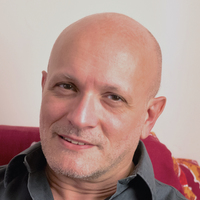
Tania Lewis
I am the research leader and co-founder of CaféLab, previous Director of the Digital Ethnography Research Centre and a Professor of Media and Communication at RMIT University in inner city Melbourne. My interests mainly revolve around sustainable living/ lifestyles/ post carbon consumption while my empirical research largely draws on video ethnography.
Hailing originally from New Zealand, I spent my school years in Wellington, Liverpool, Perth and Cape Town. My first degree was in medicine and I practiced as a doctor (mainly in psychiatry) in the early 90s. I came to cultural theory in 1993 as a refugee from all things positivistic and completed a fast-tracked honours degree and an MA in a wonderful American Studies department at Canterbury University in NZ where I was exposed to a somewhat unholy mixture of British cultural studies, continental philosophy and American literary and cultural theory and philosophy.
I moved to Melbourne University to do a PhD on the intellectual history of cultural studies (at a time when Lacan reigned supreme but my own interests lay with Foucault and Bourdieu). In the past 12 years post-PhD I have worked primarily as a Research Fellow in an eclectic mix of disciplinary settings from media studies and sociology to critical public health. My research focus, as you'll see from the papers uploaded here, has been similarly eclectic. If you are having difficulty finding the published versions of any of these articles or chapters please feel free to email me.
Cheers and thanks for reading this far!
Hailing originally from New Zealand, I spent my school years in Wellington, Liverpool, Perth and Cape Town. My first degree was in medicine and I practiced as a doctor (mainly in psychiatry) in the early 90s. I came to cultural theory in 1993 as a refugee from all things positivistic and completed a fast-tracked honours degree and an MA in a wonderful American Studies department at Canterbury University in NZ where I was exposed to a somewhat unholy mixture of British cultural studies, continental philosophy and American literary and cultural theory and philosophy.
I moved to Melbourne University to do a PhD on the intellectual history of cultural studies (at a time when Lacan reigned supreme but my own interests lay with Foucault and Bourdieu). In the past 12 years post-PhD I have worked primarily as a Research Fellow in an eclectic mix of disciplinary settings from media studies and sociology to critical public health. My research focus, as you'll see from the papers uploaded here, has been similarly eclectic. If you are having difficulty finding the published versions of any of these articles or chapters please feel free to email me.
Cheers and thanks for reading this far!
less
Related Authors
Oliver Vodeb
RMIT University
Freya Higgins-Desbiolles
University of South Australia
Fabio Parasecoli
New York University
Dr Emily Samuels-Ballantyne
University of Tasmania
Stephen Pascoe
The University of New South Wales
Ferne Edwards
University of Surrey
Nanette Carter
Swinburne University of Technology, Hawthorn
Nil Alt
University of Toronto
InterestsView All (26)









Uploads
Videos by Tania Lewis
Papers by Tania Lewis
This collection of essays provides a range of critical tools for understanding the turn towards responsible or conscience consumption and, in the process, interrogates the notion that we can shop our way to a more ethical, sustainable future. Written by leading international scholars from a variety of disciplinary backgrounds - and drawing upon examples from across the globe - Ethical Consumption makes a major contribution to the still fledgling field of ethical consumption studies. This collection is a must-read for anyone interested in the relationship between consumer culture and contemporary social life.
Table of Contents
1. Sustainability, Lifestyle and Consumption in Asia Tania Lewis 2. From Sustainable Architecture to Sustaining Comfort Practices: Air Conditioning and its Alternatives in Asia Tim Winter 3. Green Marketing and Green Consciousness in India Devleena Ghosh and Amit Jain 4. Relying on Heaven’: Natural Farming and ‘Eco-Tea’ in Taiwan Scott Writer 5. The Urban Wilds: Ecoculture, Consumption and Affect in Singapore Chris Hudson 6. Domestic ‘Eco’-tourism and the Production of a Wondrous Nature in the Philippines Sarah Webb 7. The Greying of Greenspeak? Environmental Issues, Media Discourses and Consumer Practices in China Wanning Sun 8. Building a Green Community: Grassroots Air Quality Monitoring in Urban China Janice Hua Xu 9. Keitai mizu: A Mobile Game Reflection in a Post 3/11 Tokyo, Japan Larissa Hjorth and Fumitoshi Kato 10. Living Co-ops in Korea: Sustainable Living, Communal Labor and Social Economy Sun Jung 11. "Urban Farming in Tokyo: Towards an Urban-Rural Hybrid City" Toru Terada, Makoto Yokohari, and Mamoru Amemiya 12. Farming Against Real Estate Dominance: The Ma Shi Po Community Farm in Hong Kong Kaming Wu
Table of Contents
1. Chua Beng Huat—Foreword: Rethinking Consumption in Economic Recessionary East Asia
2. Fran Martin and Tania Lewis—Lifestyle Media in Asia: Consumption, Aspiration and Identity
3. Sun Jung— Neoliberal Capitalism and Media Representation in Korean Television Series: Subversion and Sustainability
4. Wu Jing— Family, Aesthetic Authority and Class Identity in the Shadow of Neo-liberal Modernity: The Cultural Politics of Exchanging Space
5. Wanning Sun—Mediatization of Yangsheng: The Political and Cultural Economy of Health Education through Media in China
6. Yue Gao— The Pink Ribbon Campaign in Chinese Fashion Magazines: Celebrity, Luxury Life-Styles and Consumerism
7. Fang-chih Irene Yang— Empresses In The Palace and The Project of “Neoliberalization through China” in Taiwan
8. Youna Kim—Media and Cultural Cosmopolitanism: Asian Women in Transnational Flows
9. Fran Martin— Differential (Im)mobilities: Imaginative Transnationalism in Taiwanese Women’s Travel TV
10. Larissa Hjorth, Heather Horst, Sarah Pink, Baohua Zhou, Fumitoshi Kato, Genevieve Bell, Kana Ohashi, Chris Malmo, and Miao Xiao—Locating the Mobile: Intergenerational Locative Media in Tokyo, Shanghai and Melbourne
11. Tania Lewis—Dishing Up Diversity? Class, Aspirationalism and Indian Food Television
12. Bart Barendregt and Chris Hudson— Islam´s Got Talent: Television, Performance and the Islamic Public Sphere in Malaysia
Digital ethnography is central to our understanding of the social world; it can shape methodology and methods, and provides the technological tools needed to research society. The authoritative team of authors clearly set out how to research localities, objects and events as well as providing insights into exploring individuals’ or communities’ lived experiences, practices and relationships.
The book:
Defines a series of central concepts in this new branch of social and cultural research
Challenges existing conceptual and analytical categories
Showcases new and innovative methods
Theorises the digital world in new ways
Encourages us to rethink pre-digital practices, media and environments
This is the ideal introduction for anyone intending to conduct ethnographic research in today’s digital society.
This collection of essays provides a range of critical tools for understanding the turn towards responsible or conscience consumption and, in the process, interrogates the notion that we can shop our way to a more ethical, sustainable future. Written by leading international scholars from a variety of disciplinary backgrounds - and drawing upon examples from across the globe - Ethical Consumption makes a major contribution to the still fledgling field of ethical consumption studies. This collection is a must-read for anyone interested in the relationship between consumer culture and contemporary social life.
Of particular focus for this project are practices that have implications for the consumption of energy and water resources, and the opportunities for integrating sustainability into these in a holistic way. To this end, we have focused on practices in four areas: air travel, conferencing, eating, and smart buildings.
The Work Life Ecologies project will be conducting primary research, literature reviews, publishing, and engagement on these topic areas. We will periodically update this website with new articles, events, and other developments on the project. Please follow us on Twitter at @worklifeecology.